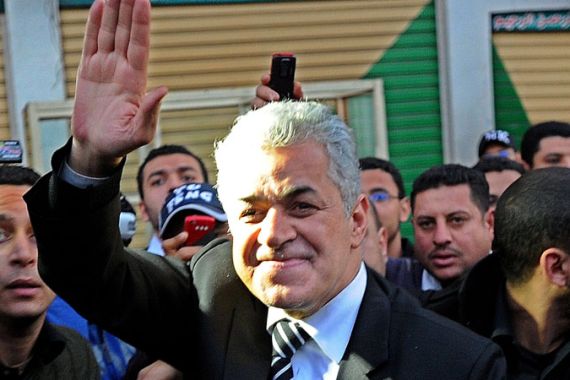Left-wing outsider to run for Egypt president
Hamdeen Sabahi, who came third in 2012 vote, joins race which Field Marshal Sisi is widely expected to contest and win.

Hamdeen Sabahi, a left-wing Egyptian politician, has announced that he will be running for president in the forthcoming election.
Field Marshal Abdel Fattah el-Sisi, the army chief, is widely expected to contest and win the race, scheduled for mid-April, although he is yet to announce his candidacy.
Sabahi, 59, came third in the 2012 presidential election won by Mohamed Morsi of the Muslim Brotherhood, who was deposed by the army in July following mass protests against his rule.
“My personal decision as a citizen is to run for the coming presidential elections,” Sabahi said in a public address to supporters on Saturday.
“Hamdeen Sabahi’s battle is the battle of the revolution.”
Sabahi built a big following during his campaign for the 2012 election, using a popular touch to beat candidates with better funded campaigns.
The dearth of candidates in advance of this election provides a stark contrast to the 2012 vote, the first time Egyptians were allowed to freely choose their head of state.
Abdel Moneim Abol Fotouh, a moderate Islamist who came fourth in that vote, has said he does not plan to run, saying the current circumstances are neither free nor democratic.
Members of his party were detained in January while campaigning against a new constitution passed in a referendum.
State crackdown
Since Morsi was deposed, hundreds of his supporters have been killed and thousands arrested in a state crackdown on the Brotherhood, Egypt’s best organised party until last year.
Sisi, 59, is popular among many Egyptians who were relieved to see the end of Morsi’s rule and who see him as the kind of strong leader needed to stabilise a country in crisis.
He has been lionised by state and privately owned media.
Sabahi appeals to a range of liberal, left-wing and secular-minded Egyptians who reject both military and Islamist rule. He is seen as a political rookie, however.
During the 2012 campaign, Sabahi saw a last-minute surge in popularity after campaigning on promises to help the poor that evoked the nationalist, socialist ideology of Gamel Abdel-Nasser, Egypt’s president from 1956 to 1970.
A journalist and sometimes actor, Sabahi has sent assuring messages to the military and Sisi supporters while disassociating himself from Morsi supporters and loyalists of deposed President Hosni Mubarak.
“There will be no tolerance to a corrupt regime and its symbols, not to Mubarak and not with the repressive regime of Morsi and his group,” he said.
Sabahi’s candidacy may attract the support of a small but growing dissident opposition movement.
Sabahi was a leading dissident against Mubarak, who ruled for three decades. He was also leader of the National Salvation Front that organised protests under Morsi.
The now mostly defunct National Salvation Front has been split between those who support Sisi and others who believe a candidate like Sabahi is needed.
Since Morsi’s overthrow, more than 1,400 people have been killed in street clashes in a crackdown on Islamists, and thousands imprisoned.
Morsi’s supporters are likely to boycott the presidential vote and have previously said they would boycott elections held by the military-installed government.
Following a perceived low turnout among youths in a constitutional referendum last month, the government has started to reach out to youth activists.
But some of the most prominent leaders of youth groups that spearheaded protests against both Mubarak and Morsi are now in jail.
Three of them were sentenced to three years in prison in December for participating in an unlicenced protest.